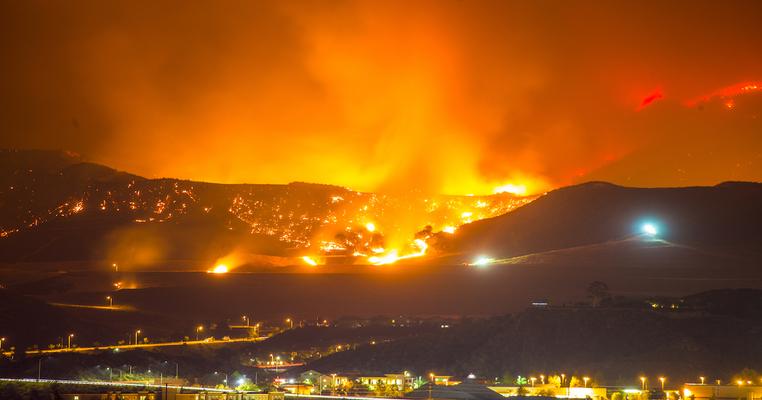
That Smoke You’re Breathing? That’s Climate Change
The metaphor might be too on the nose.
Smoke billowing up from the hundreds of thousands of burning acres in Oregon and across the US West travels thousands of miles to choke New York City. Climate change blanketing, choking the country. It’s in the air we breathe. In the water we drink.
It’s everywhere. Now.
For decades, many Americans have indulged in the fantasy that climate change was something that happens somewhere else. To someone else. Which has meant a rude shock for millions waking to the fact that it’s happening here. To us. And it will not seem to end.
We’re becoming used to seeing descriptions of extreme weather and other climate disasters as “the new normal.” And sure, it’s a great and dynamic phrase that captures in an abstract way how profoundly our world has shifted. And yet, if we’re honest, most of us expected things to return to the old normal.
In my own experience, living through a climate event like Superstorm Sandy, there’s the initial shock of the disaster and the all-adrenaline response of rising to what the moment demands. But behind that, there was also a quiet expectation that somehow, eventually, balance and order as we’ve known them would be restored. In the mind’s eye, there was already forming a Then photo of peak disaster alongside an imagined Now photo of a year later, with life largely as it had been the day before the hurricane hit. Sandy flooded half of Manhattan in 2012, but when the waters receded, the city mustered its legendary gritty resolve and rebuilt like it never happened.
Only this summer, things don’t go back to the old normal. And it’s deeply, profoundly unsettling. In a ground-disappearing-under-your-feet way
There is a privilege element to this response, of course. It’s one of the core cruelties of climate change that the poor and communities of color not only get hit hardest when extreme weather and other disasters strike, they so often are the first forgotten in recovery. Somehow they’re expected to get back on their feet despite countless bureaucratic obstacles and other challenges that White and wealthier families rarely face. All without the ample supports and subsidies the luckier ones enjoy.
For people of a certain generation and cast, climate change has been something to be bemoaned with shared nods and shrugs alongside the latest political scandal while waiting for the brunch order to appear. (The young have thankfully skipped this malaise, not having the luxury.) But when the check appears, the thought disappears.
Now, with Nature effectively doing a full-court press from wildfires to heatwaves to smoky air we cannot escape, something is happening. Life is simply changing with no end horizon in sight. And all this before even looking at the horrific floods drowning Germany and Belgium. Or the heatwaves baking India. And on and on.
Now, we all have a story to tell. Mine is about living part of the year up in the high mountains of Colorado in a town where air conditioning was never even a thought. Where you could, for many years, count on what felt like a 10-20 degree temperature drop and respite from the oven that is Denver in July.
Now, for many weeks at a time, the mountains sizzle along with the city and the rush is on to adapt places never intended for anything like this heat.
It’s as if Nature has finally engineered a way to force us past our short-termism and adaptability that is, in many other circumstances a boon.
For years, we’ve known climate change was coming, but there is always a gap between knowing and understanding, at least at the same unthought, instinctive way we understand that if we step off the top of a building, bad things will happen. Now, that gap finally seems to be shrinking.
It’s an open question whether it’s shrinking enough, of course. As the saying goes, all politics is local and for years, most Americans have enjoyed the luxury of seeing climate change as not a local issue. As not their problem. (It’s hard to imagine that millions in Bangladesh, Kiribati, and other nations suffering from the life-altering impacts of rising seas and stronger storms caused largely by rich nations’ emissions aren’t looking at the US and thinking, “Welcome to the club.”).
Naturally, the investment class has been playing a make-believe game called “Buy property where you’ll be safe.” But if there is any one lesson from a summer with the placid, temperate, and ordinarily sodden Pacific Northwest ablaze and trying to remember when the last rain came, it’s that nowhere is safe.
Which is to say, now it’s all of our problem. Seemingly every day. It’s there in the air - and we’re choking on it.
In some sense, the timing couldn’t be more apt. As the nation gasps, sweats, and more, Congress – and really, just 50 senators – have the chance to decide if and how aggressively the federal government acts in the limited time we have remaining.
Nature has a sense of humor, perhaps. Politics may be local, but climate change is and is not. The emissions of another state become the soot filling our lungs, just as ours become the angry seas swallowing their coastlines. The great leveling perhaps. Arriving, perhaps, just in time to spur the Senate while we still have time.
This is our moment to act. Sign up for our email activist list and we’ll keep you posted on how you can push Congress to pass bold climate legislation to stop global warming and rebuild America with clean energy and green jobs.

